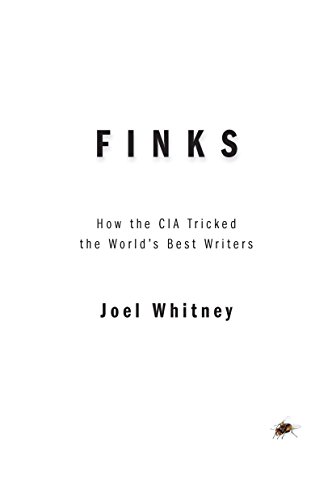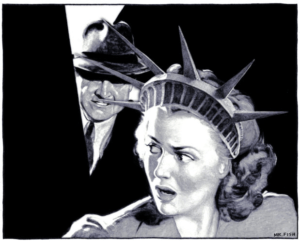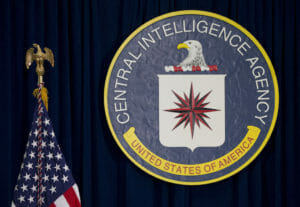‘Finks’ Explores the Blurred Line Between Propaganda and Literature
The collaboration between the CIA and some of the world's most acclaimed writers is investigated in this gripping new book. "Finks" examines CIA influence over Western writing. (OR Books)
"Finks" examines CIA influence over Western writing. (OR Books)
“Finks” examines CIA influence over Western writing. (OR Books)
Editor’s note: The following is an excerpt from “Finks: How the C.I.A. Tricked the World’s Best Writers,” by Joel Whitney. “Finks” is published by OR Books and will be available Nov. 3. Click here for details.
In early 1966, Harold “Doc” Humes, one of the founders of The Paris Review, wrote a well-intentioned ultimatum to George Plimpton, another founder. Having left it to Plimpton to run the famous magazine long before, Humes was floundering. Living in London, where his wife Anna Lou had left him over the holidays, he was dogged by bouts of extreme paranoia and convinced that he was under surveillance. According to Anna Lou, he believed that the bedposts in his London home recorded whatever he said, and that the recordings were then played directly for Queen Elizabeth.
Yet in his March 1966 letter to Plimpton, he was clear and reasonable, writing that Peter Matthiessen, another Paris Review founder, had just visited London and had told Humes an astonishing story. During his stay, Matthiessen had admitted that “The Paris Review was originally set up and used as a cover for [Matthiessen’s] activities as an agent for the Central Intelligence Agency.” Humes continued,
He further said that you [Plimpton] knew nothing about this until recently, that in fact when he told you your face “turned the color of (my) sweater” which I hasten to inform you is neither red nor blue but a very dirty grey-white, my having worn nothing else since my wife left. It precisely matches my spirits; they get greyer every day.
Humes even sympathized. “I believe Peter when he says he is properly ashamed of involving the [Paris Review] in his youthful folly, and, true, this was all 15 years ago. BUT…”
Humes was just one of The Paris Review’s larger-than-life personalities. The magazine received early praise from American publications like Time and Newsweek, and also from magazines and newspapers all over Europe. It helped launch the careers of William Styron, Terry Southern, T.C. Boyle, and Philip Roth, among others. It threw legendary parties where, for decades, actors like Warren Beatty and political and cultural figures like Jackie Kennedy would rub shoulders with New York City’s writers and book publishing rank and file. Its editor-in-chief Plimpton was already a best-selling author, a friend of the Kennedys, one of Esquire magazine’s “most attractive men in America,” and, according to Norman Mailer, the most popular man in New York City. His personal entourage drew attention, too. A 1963 Cornell Capa photograph shows a group assembled for one of the famous cocktail parties in Plimpton’s apartment. In the picture are Truman Capote, Ralph Ellison, Humes, Matthiessen, Styron, Southern, and Godfather author Mario Puzo.
***
Arguing that an association with secret institutions like the C.I.A. would inevitably lead to “rot,” Humes advised Plimpton that, for the integrity of the magazine, he should make Matthiessen’s ties during the magazine’s founding public. Citing Edmund Burke’s line “that it is enough for evil to triumph that good men do nothing,” Humes wrote, “I have deeply believed in the Review and all that we hoped it stood for, but until this matter is righted I feel I have no honorable choice but to resolutely resign. Even if I have to split an infinitive to do it.” He went on to suggest that Matthiessen might ”laugh the matter off in print in a manner calculated to restore our tarnished escutcheon…” Under these circumstances, he would stay. Barring that, however, “I should like my name removed from the masthead. I’m sure it will not be missed.”
In attempting to inspire his colleagues to come clean, Humes cited an opinion that grew increasingly common as revelations of the C.I.A.’s vast propaganda apparatus were published in Ramparts magazine and The New York Times in 1964, 1966, and 1967. Namely, that any association with the super-secret spy agency—notorious for coups, assassinations, and undermining democracy in the name of fighting communism—tainted the reputations of those involved. Humes pressed the point forcefully. “Since this was apparently a formal arrangement, involving his being trained in a New York safehouse and being paid through a cover name, then without doubt the fact is recorded in some or several dusty functionarys’ [sic] files in Washington or around the world that our hapless magazine was created and used as an engine in the damned cold war…” He continued,
although Peter is not [to] be blamed for a paranoid system that makes victims of its instruments, nevertheless what of Styron?… What of half the young writers in America who have been netted in our basket? What color would their faces turn?
Read more about author Joel Whitney here.
Your support matters…Independent journalism is under threat and overshadowed by heavily funded mainstream media.
You can help level the playing field. Become a member.
Your tax-deductible contribution keeps us digging beneath the headlines to give you thought-provoking, investigative reporting and analysis that unearths what's really happening- without compromise.
Give today to support our courageous, independent journalists.







You need to be a supporter to comment.
There are currently no responses to this article.
Be the first to respond.